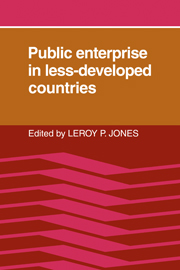Book contents
- Frontmatter
- Contents
- List of contributors
- List of figures and tables
- Preface
- 1 Introduction
- Part I Why public enterprise?
- Part II Principal-agent relationships: Who should control public enterprises?
- Part III How are decisions made in practice?
- Part IV How do public enterprises behave in international markets?
- Part V How does risk alter public-enterprise decisions?
- Part VI How are incentive structures to be designed?
- Part VII How does public enterprise compare with other intervention mechanisms in overcoming particular problems?
1 - Introduction
Published online by Cambridge University Press: 04 August 2010
- Frontmatter
- Contents
- List of contributors
- List of figures and tables
- Preface
- 1 Introduction
- Part I Why public enterprise?
- Part II Principal-agent relationships: Who should control public enterprises?
- Part III How are decisions made in practice?
- Part IV How do public enterprises behave in international markets?
- Part V How does risk alter public-enterprise decisions?
- Part VI How are incentive structures to be designed?
- Part VII How does public enterprise compare with other intervention mechanisms in overcoming particular problems?
Summary
Are public enterprises a useful unit of observation?
Public enterprise is a hybrid organization whose understanding requires a multidisciplinary perspective. As an “enterprise” it sells its output. It therefore performs functions (e.g., production, finance, and marketing) that are the concern of management specialists and is subject to the pressures of various markets, which are studied by economists. On the other hand, as a “public” organization, it is owned and/or controlled by the government or its agent. It is therefore subject to direct and indirect pressures from bureaucrats, politicians, and the public at large – groups that are studied by experts in public administration, political science, law and sociology. The chapters in this volume are accordingly a diversified group in terms of disciplinary approach.
The public enterprises studied are themselves a heterogeneous group, varying both within and across countries. As hybrids, public enterprises share characteristics of traditional government units and private business enterprises, with some being closer to one pole than to the other. Some, such as British Petroleum, are essentially autonomous and behave very much as large private enterprises operating in similar markets and with similar separation of ownership from control. At the other extreme are institutions, such as some development banks, that act largely as vehicles for implementing government policy by transmitting subsidized credit to individuals for purposes determined by bureaucratic and political processes. The public enterprises of the broad middle ground between these two extremes are of primary concern in the discussions presented here.
- Type
- Chapter
- Information
- Public Enterprise in Less Developed Countries , pp. 1 - 14Publisher: Cambridge University PressPrint publication year: 1982



